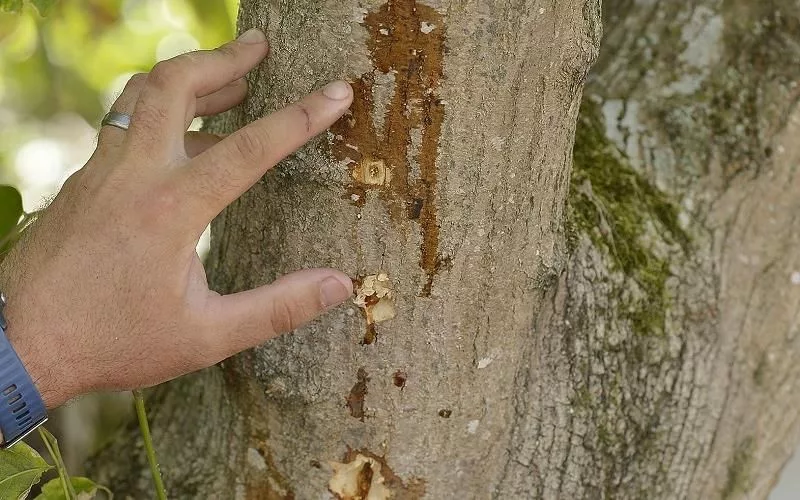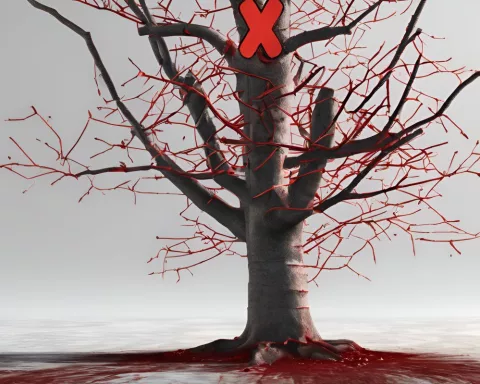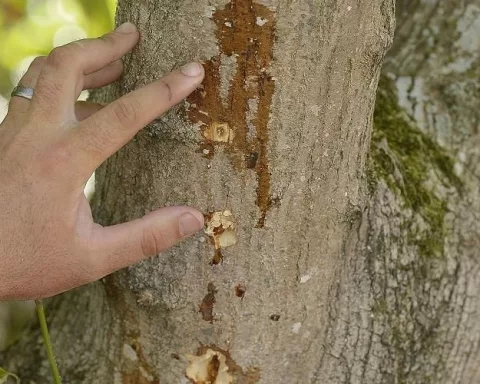The Polyphagous Shot Hole Borer beetle is an invasive species threatening Cape Town’s urban forest, and traditional pesticides are ineffective against it. Chipping infected trees on-site is crucial to preventing its spread. The City of Cape Town has initiated training sessions to raise awareness and promote eco-friendly gardening. Residents are urged to report infestations and take necessary steps to prevent the beetle from spreading, as it poses a significant risk to the city’s urban forest.
What is the Polyphagous Shot Hole Borer Beetle and how is Cape Town fighting it?
The Polyphagous Shot Hole Borer beetle is an invasive species threatening the urban forest of Cape Town, South Africa. Infected trees display branch dieback, gumming, entry and exit holes, and staining. Traditional pesticides and fungicides are ineffective against the pest, and chipping infected trees on-site is crucial to preventing the bug from spreading. The City of Cape Town has initiated complimentary training sessions for residents to raise awareness and promote eco-friendly gardens.
Section 1: Constantia’s Unwanted Visitor
A provoking combat is ripping through the lush suburb of Alphen in Constantia. The enemy? An intrusive beetle species jeopardising the region’s verdant landscape. The Polyphagous Shot Hole Borer beetle (PSHB) is the name of the culprit. It has recently marked its territory in this area, indicating its first recorded invasion.
An unsuspecting Boxelder tree in Alphen became the unwilling host to this invasive guest. A notification regarding the infested tree reached the City of Cape Town on 18 April 2024, resulting in immediate action from their Invasive Species Unit. The team verified the pressing claims and confirmed the presence of the PSHB beetle in the Boxelder tree, causing a ripple of worry among the locals.
Alderman Eddie Andrews, serving as the Deputy Mayor and Mayoral Committee Member for Spatial Planning and Environment for the City, remarks, “We cannot determine the exact number of trees affected by this pest in Alphen as ongoing investigations are in progress.”
Section 2: The Imperative Mission
His statement underscores the city’s crucial mission: to define the magnitude of the infestation. This task requires an exploration of private estates, calling for the cooperation from local inhabitants. Alderman Andrews appeals to the residents to assist in this important endeavour. He also requests collaboration from local businesses involved with plant materials, expressing profound concern about the situation.
For clear identification, city officials participating in this operation can be recognised by their City of Cape Town-branded clothing. They carry official staff cards to gain access to the private properties.
Section 3: A History of Infestations
This recent encounter with the PSHB beetle in Alphen is sadly not an isolated incident. Cape Town has a history of such invasions. Penhill and Eerste River witnessed 24 trees, including Boxelders, London Planes, and English Oaks, falling victim to this pest. The Liesbeek River region, comprising Newlands, Rondebosch, Mowbray, Claremont, Kenilworth, and Observatory, recorded 309 infested trees. The Helderberg Area has seen a shocking 4,975 trees affected since 2019.
Section 4: Recognising and Reporting PSHB Infestations
The PSHB beetle leaves distinctive signs on infected trees: branch dieback, gumming, entry and exit holes, and staining are all indicative of an infestation. When a suspected infection is identified, it is crucial to chip the tree onsite to prevent the bug from spreading to nearby areas. Residents are also advised against buying or moving firewood from infected zones.
To report PSHB beetle sightings, residents can take to the Internet or place a call to the City of Cape Town’s Invasive Species Unit. They can also drop an email at the dedicated address. If an infested tree is discovered, the city suggests several steps, such as chipping the tree and sealing the infested material in garbage bags, which should be sunned for at least six weeks. Infected wood chips can also be incinerated at suitable facilities.
Section 5: The Battle Ahead
Following these guidelines can effectively curb an uncontrollable rise in the beetle population. The PSHB beetle poses a significant risk to Cape Town’s urban forest and could easily infiltrate neighbouring suburbs if not properly managed. The bug is notorious for hitching rides on clothing, hiding in vehicle crevices, or sticking to unclean gardening tools.
Disturbingly, traditional pesticides and fungicides have shown no efficacy in exterminating PSHB from tainted trees. Thus, the attentiveness and commitment of the residents to the advised steps are paramount in constraining the spread of this invasive pest. Recognising the strength of educated citizens, the City of Cape Town has initiated complimentary training sessions for residents. Alderman Andrews encourages participation, stressing the advantages of awareness in maintaining secure and eco-friendly gardens.
The recent PSHB invasion in Alphen, Constantia emphasises a collective responsibility. A coordinated effort between the city administration, the residents, and the local businesses can halt the spread of this invasive pest. The fight may be daunting, but preserving Cape Town’s urban forest is indeed a battle worth engaging in.
What is the Polyphagous Shot Hole Borer beetle and why is it a threat to Cape Town’s urban forest?
The Polyphagous Shot Hole Borer beetle is an invasive species that poses a significant risk to Cape Town’s urban forest. It infects trees causing branch dieback, gumming, entry and exit holes, and staining. Traditional pesticides and fungicides are ineffective against this pest, and chipping infected trees on-site is crucial to prevent it from spreading.
What are the signs of a PSHB infestation and what should residents do if they suspect an infestation?
The signs of a PSHB infestation include branch dieback, gumming, entry and exit holes, and staining. Residents who suspect an infestation should report it to the City of Cape Town’s Invasive Species Unit, chip the tree on-site to prevent the bug from spreading, and avoid buying or moving firewood from infected zones.
What is the City of Cape Town doing to fight the PSHB beetle?
The City of Cape Town has initiated complimentary training sessions for residents to raise awareness and promote eco-friendly gardening. City officials are exploring private estates to identify and contain the infestation. The City also urges residents to report infestations and take necessary steps to prevent the beetle from spreading.
Why are traditional pesticides and fungicides ineffective against the PSHB beetle?
Traditional pesticides and fungicides are ineffective against the PSHB beetle because it has symbiotic fungi in its body that protect it from these chemicals.
What is the history of PSHB infestations in Cape Town?
Cape Town has a history of PSHB infestations in regions like Penhill, Eerste River, Liesbeek River, and Helderberg Area. The Helderberg Area has seen a shocking 4,975 trees affected since 2019.
Why is it important for residents to cooperate with the City’s efforts to fight the PSHB beetle?
The PSHB beetle poses a significant risk to Cape Town’s urban forest, and it could easily infiltrate neighbouring suburbs if not properly managed. The attentiveness and commitment of the residents to the advised steps are paramount in constraining the spread of this invasive pest.












